The Pen Newspaper
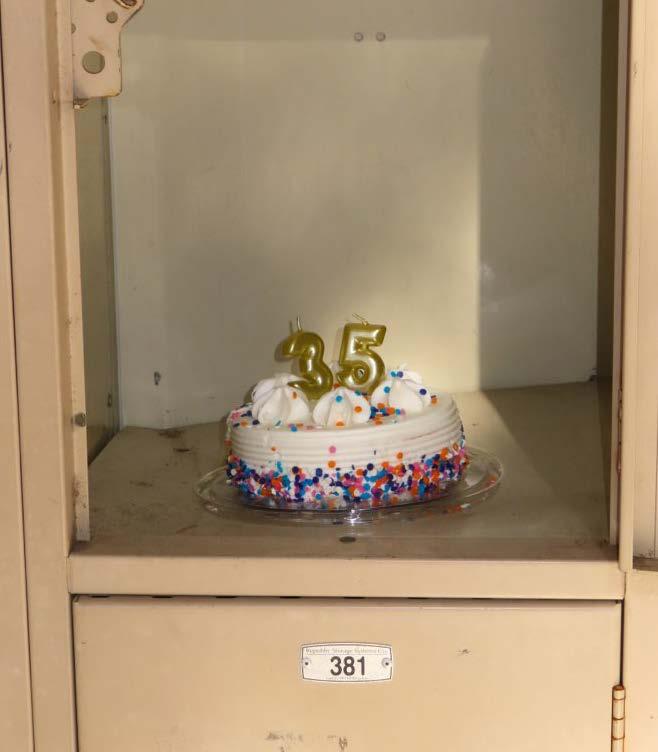


In wake of a state-wide ban on cell phone use in public schools across Texas, and the more recent ban in Los Angeles Unified School District, phone use in Palos Verdes schools may be heavily restricted. The discussion comes as a result of California’s recently-passed Phone-Free Schools Act, requiring public schools to formulate a plan for restricting cell phone use on campus by July 2026 (LA Times). School response to the new policy has been varied, but LAUSD has opted to enforce a total ban through the use of YONDR pouches (Edsource). Originally designed for concerts, YONDR pouches secure devices through magnetic locks, allowing students to still be able to hold their phones throughout the day without actually using them. The reasoning behind sharper regulation and bans stems from concerns that phones increase feelings of stress in students and risk jeopardizing their academic in tegrity. Yet the decision has caused massive back lash from both parents and students. Peninsula should not enforce a total ban on phones during school, and instead use proactive policies to teach students independence and self-regulation.
One of the principal concerns of parents is safety, particularly in light of rapidly growing school shooting incidents. This is a rea sonable concern as student phone calls are often a vital way to reach law enforcement or medical services during shootings or other emergencies (The Black Wall Street Times). So, while YONDR pouches have grown in popularity among administrators, including PVPUSD, restricting access to phones would endanger students by rendering students unable to call for help in an emergency situation. Peninsula’s current policy is flexible, and ‘middle of the road’ compared to other districts. Whether students can access their phones is up to the policies of individual teachers, who have the option of confiscating devices if used without permission. More often than not, students maintain possession and access to their phones, but keep them tucked away during instructional time.
current policy.
“Honestly, I kind of like it,” Moakley said. “I think that it is good [that] we are not allowed to use them in class without teachers’ permission. I really enjoy how we are allowed to use them during snack and lunch, so I am able to get my clash sessions in before class.”
Despite this, it is certainly true that while phones may be used to connect, they can also be tools for isolation. To combat this, schools must reaffirm the role of conversation in our everyday lives, or it risks losing its capacity for compassion and creativity (Greater Good). Despite this, YONDR pouches are not the responsible solution. By locking up phones, schools do not allow high schoolers to make the conscious decision of putting them down or to recognize their role in modern society. Junior Evelyn Choy acknowledged the dangers of phone use, but expressed her desire

“Phones definitely take away from socializing sometimes and maybe even learning,” Choy said. “But how will we learn to manage it on our own when the school decides for us? We need independence and guidance, not more rules.”
Independence is a key part of children and teenagers’ psychological development, and is strongly linked to creating secure and well-adjusted young people (National Poll on Children’s Health). Students should learn on their own how to manage time, social situations and learning. Doing so would better prepare them for the future because in real life, in their careers and at home no one is banning the phone. There must be an individual choice to put it down.
EDITORS-IN-CHIEF
Haylie Kim
Sivan Stoler
HEAD OF DESIGN
Esperanza Engle-Tseng
HEAD OF BUSINESS
Melina Ajami
EDITORS
Selah Hartman
Mason Kim
Elyssa Lee
Adam Lu
James Pan
Elena Thomas
Thanh Vuong
WRITERS
Parisa Bahrami
Ingu Bat-Yeruul
Savannah Diaz
Sophia Duzrich
Giana Geerdts
Emersyn Hadley
Billy Houng
Adam Khaja
Colin Kim
Mason Kim
Olivia Kim
Gunnar Lee
Alissa Luna
Sydney Malicse
Kyra McGath
Celanie Neal
Khalil Santiago
Alisa Sekine
Sophia Shen
Briana Ta
Another argument for keeping phones on campus is the fact that they have become an important part of everyday life. Due to this, the idea that phones can no longer be removed from the equation, but rather must be worked around has gained increasing recognition (NPR). Phones are used for everything: from research, to taking photos and even doing things like accessing menus at restaurants. School is no different — assignments are posted online, forms need electronic signatures and every school event is announced on Instagram. Thus, devices have become a key component of education, and there is no feasible way to truly ‘ban’ them when they play such a vital role in daily tasks. While it may be possible to transition back into physical textbooks and pen and paper exams or essays it would be extremely impractical to do so, especially after American schools embraced digital assignments and books after COVID-19. PVPUSD’s final policy must either integrate devices into the classroom, and maintain student independence. Concerning potential phone regulations, freshman Joey Moakley expressed his preference for Peninsula’s
Edited by Mason Kim | 12
Beyond this, independence fosters student interests while also respecting the learning environment, a key example of why Peninsula’s policy is the best of both worlds regarding phones. Micromanagement from administration would only produce negative outcomes, as teenagers are less likely to socialize when they are being forced to do so. Therefore, maintaining its middle-of-the-road approach is Peninsula’s best option for fostering a student body that is both educated and independent.
Teachers around the world are finding new innovative ways to reinvent how students learn in an age where smartphones are inescapable. The district should focus on supporting such creative solutions rather than suppressing the usage of phones. While phones in schools are certainly a complicated issue, the solution is not any simpler, and cannot be something as black-and-whtie as a full ban. The solution begins with students actively taking steps toward connection, instead of remaining glued to screens during school hours. Encouraging them to make that decision, instead of forcing it, is where schools should step in. Staff can lead by example by putting their phones down. Administration can also ensure engaging activities are offered, giving students an escape from their devices. The PVPUSD has the chance to meet the future of education head-on, and should not squander it by keeping its students in the past.
Noah Vaidyan
DESIGN
Brian Hong
Jiayu Tang
Matthew Yi
BUSINESS
Halynn Campos Lara
Allison Kumamoto
Sayuri Shibata
Haley Wong
Elise Vu
WEBSITE
Wendy Hu
SOCIAL MEDIA
Asher Brunski
ADVISER
Jaymee DeMeyer
Billy Houng | 11
In an effort to salvage a divided United States, President Donald Trump has revived a former title to the Department of Defense: the Department of War (the White House). On Sept. 5, President Trump marked the revision’s effective beginning by signaling his approval of the official subtitle, “Department of War.” Promptly labelled, “Restoring the United States Department of War” on the White House’s official website, this proudly boasted change never received congressional consent. Instead, Pres ident Trump sought a loophole: a signed executive order to permit Defense Secretary Pete Hegseth to refer to himself as “Secretary of War” and promote the title’s adoption across the department (Politico). By restoring the Department of Defense back to the Department of War, America runs the risk of being internationally challenged, as well as arousing skepti cism from its own people.
Meanwhile, domestic public consensus is far from uniform — many citizens argue in favor of the change, claiming it strengthens American resolve (BBC News). However, countless people sway in the opposite direction (Politico). A ratio of 4:1 has been defined in terms of “strongly oppose” versus “strong ly support”, meanwhile, 19% of voters remained unsure of which side to take (YouGov). The ideals the president beams forth on behalf of the country are taken at face-value by the rest of the globe, who presume that these are the core beliefs of all Americans. With the latter being a myth, as the American opin ion is split, this goes to show the pervasive discontent with representation regarding this matter. Whether it was intentional or not, the new title certaintly altered foreign perception of America’s values.
The origin of the department was derived from decades of disorganized dispute. In 1789, amid the fragility of a newborn nation, the founding fathers promoted a centralized body to assert control and provide defense over the lands and waters encom passed by American territory. They dubbed it, “the Department of War.” Notably, it was established to safeguard the people who resided on American soil against foreign threats. “Safeguarding” did not include the invasion of territories for political, social or economic benefit (Politico). The name stuck around for the next 158 years, until President Harry Truman announced its official rebranding in 1947. The implementation of such a body was “directed not toward war — not toward conquest — but toward peace,” as was his justification (The New York Times). These ideals, humble in origin, met the world with neutrality. Peace, the priority of America, had ultimately been achieved. Despite this, President Donald Trump insists on the reinstitution of this former alias, thereby establishing a new definition of “peace.” His logic is as follows: “... a much more appropriate name, in light of where the world is right now,” and that it, “sends a message of victory” (NBC News). Sophomore Colin O’Brien expressed his outlook on the controversy surrounding the infamous name change.
“I do not think it sends a message of victory. I think it just puts us into a worse light than we already are,” O’Brien said. “It [makes America seem] more aggressive than [it] should be. [‘War’] is not the right message to be putting out.”
Undoubtedly, many deplorable stereotypes of Americans have been universally accepted for an extended period of time. The United State’s foreign outlook is tainted with the blood of its own people; crime rate is notoriously high in comparison to

Erikson, a veteran of the debate team, offered his input on the motive behind the name’s recent overhaul.
“[The name change] tells [us] what sort of mindset the Trump Administration has,” Erikson said. “They [are] definitely much more in favor of deterrence policy, as well as peace-through-strength wartime attitudes.”
Deterrence policy, the discouraging of potential conflict by inflicting responsive destruction if prompted, emphasizes strength in domination. President Trump embraces this mindset — utilizing this technique to promote peace through authority, hence the slogan “peace-through-strength” (Brookings). However, the amount of wealth the U.S. expends to enforce deterrence policy is highly unconventional. The U.S. achieved peace at the cost
of $997 billion, accounting for 37% of the world’s total military spending in 2024 alone (SIPRI). If a great portion of that budget could be redirected to internal improvements and general welfare, millions of citizens would enjoy a higher quality of life. To put this into perspective, one millionth of that budget would cover the cost of fourteen million meals for those in need (FoodBanking Network). Instead, America allocates these funds to “heightened security” — spurring a waterfall of influx in military equipment, which only intensifies global rivalries. The U.S. successfully retaining its reputation as the globe’s largest militaristic power does not speak great volumes for peace; rather, the country looks as though it is getting ready for violence.
The overhanging problem with the Department of War is its inability to communicate the right message to the world. With many implications in mind, sophomore August Agudamu noted his observations
“Any type of conflict might lead to [aggression]. The [name change] could [incite] a psychological response, but not [necessarily] a [literal] global war,” Agudamu said. “[Regarding] the name change, I [lean] more to the side of [the Department of] Defense. [The change] was not worth it [at] all.”
Though by no means a declaration of war, the American public reaps the consequences of President Trump’s assertions; under his ideology, the common household would uphold a new, purely psychological “attitude,” specifically embracing radical peace and a healthy measure of pride. This controversial change in “attitude” was made in hopes of embracing a contemporary American “warrior ethos” (RNZ). Studies have shown that American patriotism, including ideals such as “warrior ethos,” have been on the decline since the late 1990s (USAWC). In reality, “warrior ethos” is not embraced as broadly by common citizens, leading the Trump Administration to attempt to reignite it, which has proven difficult. Not to say that this refined mentality would not have come without numerous benefits; just, the plan failed in its execution. The truth is this: the inhabitants of America are a peace-loving nation composed of ethnicities originating from all corners of the globe — unified under free commerce, free communication and unparalleled prospects. The people hold this as their identity. Younger generations, the adolescents who do not study politics, value neither the diction behind a stark political figure’s speech, nor the subtle rewording of a name, nor the pride in “warrior ethos.” Instead, they take part in a future that is being destined for them, often under the premise that their opinions have no impact. Mirroring this, the students at Peninsula wish to live their lives as usual — without every trivial syllable that their president utters about America reshaping how they compose themselves to the rest of the world. President Trump feigns neutrality while puffing out America’s chest in an attempt at intimidation. The effects are both international and domestic: some countries have offbeat interpretations of Trump’s intentions (Politico).
When the framers of the constitution enshrined the freedom of speech in the Bill of Rights, they intended it to be all encompassing, protected and treasured by the American people for years to come. However, recently, the first amendment has repeatedly been under attack from all sides of the political spectrum. On Sept. 10, conservative political commentator Charlie Kirk was killed at a campus event at the University of Utah (ABC News). Just six days later, Walt Disney owned ABC announced that “Jimmy Kimmel Live!” would be taken off the air indefinitely after Kimmel’s controversial on-air remarks regarding Kirk’s assassination sparked national outrage (USA Today). What began as an act of violence soon turned into a national movement, raising questions about the future of free speech and the nature of today’s increasingly polarized political culture.
Kirk began his career at just 18 when he co-founded Turning Point USA, a student-led organization focused on spreading conservative ideas on college campuses (BBC). As the group grew, Kirk became known for his confrontational debate style, often engaging directly with students who challenged his right-winged Christian views. His unapologetic approach resonated with many young conservatives, helping him first build a massive online following on Youtube and Instagram, and eventually TikTok and X (BBC). However, such strong support also came with intense backlash. Kirk regularly made controversial remarks on topics ranging from race to religion and abortion, which many criticized as intolerant or bigoted (The Guardian). He often framed these statements as simple expressions of his faith or free thought, but
in practice, they often deepened social divides and alienated those whom his words targeted.
In the United States, the First Amendment protects every citizen’s right to free speech, even if those words offend us. Regardless of how deeply one may disagree with Kirk’s rhetoric, he was just exercising that right. No one deserves to be killed for their opinions. Yet acknowledging the injustice of his death does not mean absolving him of the harm his speech caused. Many people, particularly minorities, were directly hurt by his words which often dismissed their struggles and questioned their dignity. Kirk, a privileged white man with a massive platform, spoke freely without ever facing the systemic oppression he so often discounted. His assassination sent shockwaves across the nations, sparking endless media coverage and massive memorials that, notably, overshadowed reports of a school shooting in Colorado the same day (NBC News).
In the flurry of media attention after Kirk’s assassination, a single television personality seemed to spark the most ire in the Trump administration: late-night host Jimmy Kimmel. After commenting in his nightly monologue about MAGA making Kirk’s killer out to be “anyone but one of them,” the Federal Communications Commission (FCC) ordered ABC to take Kimmel off air indefinitely (New York Times). FCC head and fierce Trump ally, Brenden Carr claimed that the FCC took this action because Kimmel’s comments amounted to “news distortion.” After a public outpouring of support for Kimmel and outrage toward ABC’s parent company, Disney, Kimmel’s show returned to air on Sept. 23.
Although the debacle surrounding Kimmel’s cancellation may have concluded, the fact that a federal agency was able to limit the expression of a private citizen for simply saying something that the
current administration does not support, represents a clear threat to the First Amendment. This threat is especially concerning when considering Trump’s personal vendetta against Kimmel. For years, he has criticized Kimmel’s liberal comedy and political commentary, and in the wake of Stephen Colbert’s cancellation on CBS in July, he posted on his Truth Social Platform that “Jimmy Kimmel is [the] NEXT [host] to go.”
Even if Trump did not directly order Kimmel’s show be taken off air, there is a pattern present in these posts and their subsequent reactions from the FCC that is hard to ignore: Trump was openly threatening Kimmel for acting against his and his supporters’ beliefs, and then Kimmel got deplatformed by a federal agency close with the Trump Administration. In this light, Kimmel’s free speech was flagrantly restricted by the federal government for no reason other than his daring to offer a different opinion than the opinion that the government was promoting.
Free speech, in its truest form, must protect everyone regardless of whether it is used responsibly or recklessly. Even if Jimmy Kimmel’s comments about Kirk were cruel or in poor taste, his right to express them remains protected under the same Constitution that shielded Kirk’s right to debate freely. Both men were exercising a right prescribed to them 250 years ago. It is impossible to criticize the consequences that one faced for doing so without also denouncing the other’s. The moment we begin differentiating between which voices deserve protection and which do not, we begin to abandon the foundation of our democracy. Free speech is meant to be for all, and Americans must work to protect it – it is far too precious of an inheritance to allow it to be taken away.
Dear Readers,
When we realized that this issue would mark the start of The Pen’s 35th year as Peninsula’s student newspaper, we had trouble deciding where to focus our attention. We could look back on the years when “paste-up” meant physically attaching articles onto paper by hand. We could spotlight the countless writers, editors, artists, photographers and business managers who came before us. We could even reflect on The Pen’s transition into a digital publication over the past few years.
But the truth is, all of that has already been done. There are 12,775 days worth of interviews, graphic requests, paste-ups and ruminations on adapting to the digital age. What hasn’t been done yet, what hasn’t been written and what hasn’t even been decided, is the future. And that is what this issue is all about.
Within these pages, you will find everything you need to know about our new principal, Dr. Garrity (page 18); advice for our newest panthers (page 8); profiles on the teachers shaping Peninsula’s next generation (page 9) and even coverage of the new bathroom remodels (page 6). Each story was carefully chosen to represent the beginning of the next 35 years of Peninsula’s – and of The Pen’s – history.
We hope you enjoy reading this issue as much as we and our incredibly dedicated staff enjoyed creating it.
With Love, Haylie Kim
Sivan Stoler



Sophia Duzich | 9
With deteriorating concrete, a rusted floor and chipping tile, the more than 50 year old pool at Miraleste Intermediate School was in desperate need of repair. At a groundbreaking ceremony on Sept. 14, 2025, the first step in the pool’s $2 million renovation was taken. A sea of smiles could be seen at the ceremony as board members, staff, families and students gathered around to hear the exciting new plans for the pool. The new improvements will include underground lighting, redone plaster and tile and new diving boards. Unsurprisingly, students are thrilled for the much-needed remodel. Coach and lifeguard Jeffrey Webb commented on the current state of the pool.
“As you can see, there are lots of uneven surfaces and sharp edges,” Webb said. “The pool and deck are also very compromised. I am just really happy they are going to replace it all.”
Thanks to the Measure SOS school bond, Miraleste and other PVPUSD schools have been able to receive funding for the repairs of numerous facilities. The bond measure will cover the cost of the renovation and ensure that district
schools receive needed renovations through taxpayer funds. Principal Michael Lehault shared that getting the required funding was not an easy or quick process.
“Architectural work has to go through the Department of State Architects (DSA) that is funded through our district,” Lehault said. “Bond Measure SOS will fund this pool, but will also fund other projects throughout [the] PVPUSD.”
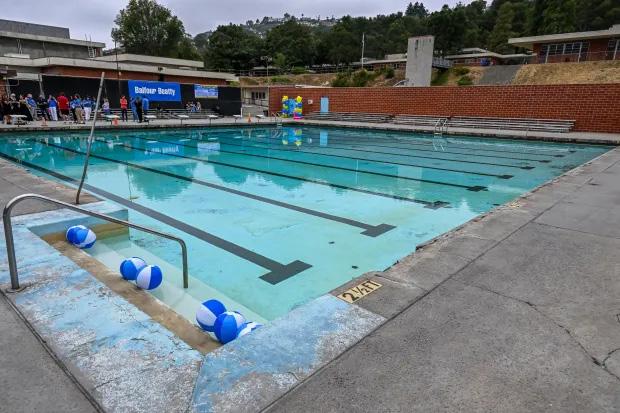
The renovation is expected to be completed in mid-February. This means that the pool will be ready just in time for the spring swim unit in Miraleste’s P.E. classes. In the meantime, all pool-related activities will be postponed until the pool’s completion. This is for students’ safety as much
Brokenmirrors, sinks pulled out of walls and destroyed locks all once used to be the norm for the boys bathrooms at Peninsula. Last year saw a drastic increase in vandalism, resulting in empty soap dispensers in the middle of the day, broken sinks and damaged appliances being commonplace. Since the bathrooms are one of the only places on campus that can’t be monitored, it was difficult for staff to control this. Furthermore, this was solely an issue in the boys’ bathroom, which raises questions regarding the motives behind such destruction. Associate Principal Dr. Regina Corwin shared her thoughts on the nature of the vandalism and described what the procedure would look like when the damage was reported.
“I didn’t get [any] calls about girls vandalizing the bathrooms, but the boys in both buildings, not in the P building, but the two older buildings [is where] we were seeing things happening,” Corwin explains. “The students would report it to the teachers, the teachers would report it to the office staff and I would have our custodian put in the work orders to repair them.”
However, this pattern came to an end over the summer with a renovation to repair the majority of the damages. Prior to the remodeling, only one to two of the many boys’ bathrooms on campus were open at a time. This made it difficult to use
Edited by Adam Lu &
as it is for convenience, since the pool exhibits a high degree of deterioration. The damage is especially noticeable on its floor and edges. There is also a great deal of damage to the diving boards and the concrete surrounding it. The renovation will ensure the safety of the swimmers and provide a much-needed morale boost for students in the school’s P.E. program. Miraleste eighth grader Aalyiah Roumini reflected on the renovation.
“We have been using the pool for the last few weeks for the swim unit. I am excited for the pool to be reopened, just like many of the other kids here are,” Roumini said. “[We’re excited because] swimming in the pool is much more fun than having to run the mile.”
The renovation does not only benefit the middle school students, however. Peninsula’s water polo team often uses Miraleste’s pool as a replacement whenever Peninsula’s pool is closed. For Miraleste graduates gunning for Peninsula’s water polo team, this means they need not bid farewell to their beloved swimming pool. In this way, the impact of the swimming pool renovation transcends boundaries like mere grade level and school. The Measure SOS school bond will allow the pool to be restored to its former pristine state.
the restrooms quickly during classes or passing periods. Additionally, the bathrooms that were open had experienced damages, making it extremely difficult for students to use them. Fortunately, due to the remodeling, that is no longer an issue. Peninsula students are finally able to use the bathroom nearest to them, without encountering damages. Junior Dylan Luppo spoke on the past state of the boys’ restrooms.

Photo Courtesy of Adam Lu
“The sinks have definitely been broken. The locks [on the doors] get bent and destroyed a lot, probably from people [purposefully] slamming the doors or something. [There was always] a lot of trash on the floor,” Luppo said. “There’s like five or six [bathrooms] and last year, usually at one time there were only one to two open, and the ones that were open, the sinks were smashed [and other things were destroyed]. It’s gotten better because a lot of the bathrooms are open.”
Additionally, this vandalism was an issue for
Peninsula’s custodial team. Corwin recalled that the custodians had difficulties due to students repeatedly destroying and emptying things like soap dispensers, toilet paper holders and paper towel dispensers. This led students to be without basic amenities for days on end and custodians constantly refilling the dispensers.
While the suspect was never caught, there is speculation that one singular student was responsible for the majority of the damages. It is assumed that the student responsible has graduated since the vandalism has stopped since the renovation over the summer. Counselor Adam Wolven spoke on these rumours, and what would have been done if the student was ever caught.
“There was a rumor that it was one student who was causing the damage to the boys’ bathroom. My understanding [is that] there were multiple incidents in multiple bathrooms,” Wolven said. “Depending on the severity of the incident, it could lead to Saturday school or suspension. We could report it to the police department or they could be asked to pay for the damages.”
Since the renovation, no reports have been made of extreme vandalism or large scale damages in the boys’ bathroom. Students and faculty alike can agree that the bathrooms are in much better condition than they have been in the past few years. Ultimately, the PVPUSD’s significant financial contribution in repairing the restrooms signals a shift toward increasingly strict policies.
Mason Kim| 9
In June, Paul Seo, the Mayor Pro Tem of Rancho Palos Verdes (RPV), announced that he is running for California’s 66th State Assembly District. As Mayor Pro Tem, Seo helped lead the City Council of RPV by setting meeting agendas, representing the mayor when needed and putting policies into effect. California’s 66th State Assembly District encompasses Palos Verdes, Torrance, Redondo Beach and other nearby communities. If elected, Seo would resign as Mayor Pro Tem and join the state legislature, marking a major step in his political career.
This announcement sparked interest among the members of the local RPV community. Students on campus have shared their thoughts on what the news means for people living here.
“It is inspiring to see someone from our area running,” freshman Gavin Dunst said. “It shows that people from our community can step up and represent us on a larger scale.”

To truly understand Seo’s qualifications, it is important to look at them in their totality. Seo grew up in Torrance and graduated from the United States Military Academy at West Point. During his subsequent military service, he was stationed in South Korea. After the Army, he attended Loyola Law School before serving as a Deputy Attorney General in the California Department of Justice (Paul Seo for Assembly). In 2022, Seo was elected to the RPV City Council and became Mayor Pro Tem shortly afterward. Since then, he has worked on projects involving city planning, public safety and emergency response. During his time on the City Council, Seo coordinated efforts to address landslides and storm damage in local neighborhoods, oversaw improvements to the city’s infrastructure, and advocated for programs aimed at keeping the
community safe. Some students think that Paul Seo’s candidacy has positive implications for residents of our community.
“It’s impressive to see someone local taking the initiative to make a difference. When politicians come from our own community, they understand the issues and challenges we face on a daily basis,” freshman Noah Kim said. “Having someone like Seo in office could mean more attention to the issues that actually matter to us, like safety, education and affordability.”
Seo’s leadership style and policies reflect the life experiences that have molded him into who he is today. His time in the military, law and local government reflect a practical approach to problem-solving and leadership. Seo emphasizes that he is the only candidate in the race with first-hand experience in municipal leadership, which he believes gives him the upper hand in understanding the challenges that residents commonly face. He believes that the skills he learned from his past work will help him address issues at the state level. This focus on hands-on actions, along with his plans to make life more affordable, invest in public safety and support education and workforce training, forms the foundation of his campaign (Paul Seo for Assembly). Seo is the sort of leader that was not only born one, but one that completely grew into the role.
“My parents instilled in me from an early age to ‘be someone this country needs’ and to ‘give back to the community’,” Seo said. “From leading troops in the Demilitarized Zone between South Korea and North Korea to prosecuting for the State Assembly to help working families get ahead, protect people’s rights and keep our communities safe and healthy.”
Seo’s campaign for state assembly focuses on improving housing, education and public safety. He aims to increase affordable housing options, strengthen school funding and create more support for law enforcement and emergency response services (Paul Seo for Assembly). These
budget cuts for Redondo Beach schools throughout prior years, which is primarily due to the decline in enrollment of students and the loss of federal funds from the COVID era. By addressing these issues, Seo hopes to build “safer neighborhoods for every family” (Paul Seo for Assembly).

Other candidates running for the 66th District include Sara Deen, a member of the Palos Verdes Peninsula Unified School Board, Scott Houston, a West Basin Municipal Water District board member and Shannon Ross, a member of the Los Angeles County Beach Commission (“2026 California State Assembly Election”). Deen focuses heavily on education policy, Houston emphasizes water conservation and Ross wants to improve coastal management. They are mostly single-issue candidates, in contrast to the blanket of improvements Seo heralds. The primary election may still be more than half a year away, but Paul Seo shared that he is more than ready to take on the role.
My parents instilled in me from an early age to be someone this country needs and to give back to the community.
-Paul Seo | Mayor Pro Tem " "
issues reflect challenges that the district has faced in prior years – specifically, the recent increase in the price of houses in the Torrance area (Redfin). Another major issue would be the substantial
“The primary election for the 66th Assembly District is scheduled for June 2, 2026, with the general election planned for November 3, 2026,” Seo said. “I’m ready to bring my experience from the City Council and military service to Sacramento to serve our communities effectively.”
Seo’s campaign demonstrates how local leaders can transition to a higher level of government, applying their skills to broader issues that affect millions of Californians. Seo’s run for the 66th District State Assembly marks an important moment for RPV and surrounding cities as someone who has positively affected local communities steps up and accepts the challenge to join the assembly. As the campaign continues, Palos Verdes residents will be watching closely to see how Seo’s message resonates with voters from a wider population of Californians, and whether his leadership experience can win him a seat a State Assembly seat in Sacramento.
Ingu Bat-Yeruul | 10

can feel like stepping into a whole new world. The campus is bigger, more confusing and everyone else seems to be fitting in fast. In a new environment, freshmen often feel nervous, out of place or overwhelmed. These “freshman fears” are often persistent, but the good news is that they will not last forever. With some advice from fellow classmates and upperclassmen, students will discover that high school is not as scary as it seems.
THE WORKLOAD:
One of the biggest stressors for freshmen is the workload. When asked, freshmen say that they struggle with how quickly everything started, especially homework. While it is true that teachers expect students to be more independent and assign homework that can pile up quickly, the key to achieving success in classes is to stay organized and be on top of assignments. Missing one or two assignments may not seem like a big deal at the time, until the workload starts to pile up. A key way to overcome this challenge is to find a system that works. Some students like to use planners to keep track of their homework and activities in order not to forget anything important. Sophomore Chloe Cao participates in multiple school clubs, is a captain for Junior Varsity (JV) girls cheer and is in the orchestra. With a busy schedule, Cao has found some ways to stay on top of her work and shares how she keeps track of her workload.
“I use the notion website to keep track of all my assignments and future tests. I also use my planner if there is an assignment that I see on the board in class so I will not forget about it. [Another] thing I started using in high school is the calendar app on my phone,” Cao said. “It [has] helped me become more independent because I can keep track of my own schedule and planning. I think it is something that every student should utilize.”
Another method is having different color-coded binders for each class. That way, every single assignment or handout will be easily accessible and have a certain place to be filed. For some it might be easier to just simply set up digital reminders for classwork, meetings and assignments.
Freshmen also express how one of their fears is forgetting homework and assignments at home. Staying consistent is about showing up and putting in the work everyday to meet academic goals. To stay consistent, create a structured routine, break up work to make it more manageable and optimize your environment by arranging your space to support your goals. It is also important to realize that consistency does not mean perfection. Messing up once by getting a poor grade or forgetting an assignment is not a reason to give up; the key is to start again the next day and not let one missed step disencourage the progress.
Freshmen tend to put themselves under a lot of pressure to be perfect, to keep up with their classmates and to fit in. The truth is, even if it may appear otherwise, no one truly has it all figured out. Alexis Jang, freshmen class president, shares tips to other freshmen who are nervous about the school year.
“Everyone is in the same boat that you are in and everybody is nervous since this is all so new to us,” Jang said. “I think of [freshman year] as something to not be that nervous about, especially because we are all experiencing it at the same time and there are always people you can reach out to.”
Her advice can help with stress and burnout that can arise from putting too much pressure on yourself. A healthier approach is to focus on progress instead of perfection. Break big goals into smaller steps, celebrate small wins and remember that mistakes are part of growth. Giving yourself permission to stumble and learn makes the journey less overwhelming and much more rewarding.
High school is not just about academics, it is about learning how to manage all parts of life at once. Freshmen can feel pulled in every direction, from homework and sports to family, friends and personal time. It is essential to find a balance between academics and taking a break. Read a book you like, hang out with friends or spend time doing things that are enjoyable. Schoolwork is important, but so is rest. Getting a good night’s sleep can also help with feeling better mentally as a freshman. Staying up all night binging a
show or scrolling mindlessly on your phone might feel fine in the moment, but doing so just to feel exhausted the next day is not worth it.
Entering high school, freshmen also mention that they are scared of losing friends or even having fake friends. Instead of viewing the unknown expanses of high school negatively, view it as a chance to restart socially. Be open to meeting new people in classes, clubs and at events like the Fresh Fest. Link Crew leader, senior Sneha Ramanuja has attended these activities as both a freshman and as a leader who plays a part in planning them. Ramanuja shares how attending these activities has helped her meet new friends as well as get close to her new school’s student body.
“The best part [of being involved in school activities] is the fact that I get to meet so many people and try many things,” Ramanuja said. “Yes, it is a time commitment, but I would rather be doing different fun activities with new people or just my friends instead of just sitting at home doing homework all of the time.”
Throughout the school year, students might notice they have drifted from their group of friends. Drifting from old friends is natural, but that always opens an opportunity to meet new people. At the same time, it is perfectly normal to take time to find a group of friends with whom you truly feel you belong. It is always better to have a few genuine friends than a big group of people that are not right for you. At the end of the day, adapting to high school is about patience and effort.The fears that freshmen may feel will go away as the school year progresses, but the lessons that these fears allow students to learn during these years will stick with them long after freshman year. No one magically knows how to handle new friendships, large courseloads or balancing the many responsibilities of being a high schooler. By the end of their high school careers, students will be able to look back and realize that they have grown more than they thought was possible.

Anew school year means fresh beginnings and unfamiliar faces, and this year is no exception as Peninsula welcomes three new teachers. From English to science and music, they are enthusiastic about sharing their passions and creative mindsets with their students.
Among these new faces is Miles Crisostomo, who has joined the faculty as an English I and English I Honors teacher. He strives to make his classroom an engaging and enjoyable space that fosters creativity among students. In the beginning of his teaching career, Crisostomo was inspired by his own teachers, who helped him discover his inner confidence and develop the leadership and adaptability skills he needed to succeed beyond the classroom. For instance, as a child, he was told that he was disruptive and talkative by most of his teachers. His fourth grade teacher had seen what others called unruliness, as a guiding light in Crisostomo. Rather than disruptive, he saw that Crisostomo was social and had a knack for collaborating. Eventually, this teacher inspired him to pursue teaching. He first graduated from UCLA, and then earned his teaching credential and Master of Arts in Teaching at USC. He states that he has always wanted his students to feel like they have someone in their corner, whom they can trust and rely on. This is because he understands that before they are students, they are humans who, just like anyone, will sometimes need a little help. Above all, he emphasizes the importance of respect as a key foundation for learning.
“Being a good teacher means acknowledging students’ presence and showing them that you care,” Crisostomo said. “I think that is the catalyst for being able to help them grow. If you don’t engage and collaborate with them, they are not going to truly be engaged in you or your class.”
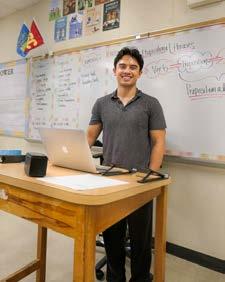
Another addition this year is Earth Science, Biology and AP Environmental Science teacher Kyle McCracken. Before becoming a teacher, McCracken worked as a marine biologist, focusing on the study of fish in Hawaii. When he decided fieldwork was no longer the right fit for him, a run-in with a former teacher inspired him to consider teaching. Since beginning a career in teaching, he has loved every minute. He maintains a simple yet powerful teaching philosophy: to truly understand something, one must first love it. To help his students do just that, he begins by explaining why the material matters. He then guides them through the more complex details in order for them to understand what is necessary to understand the subject matter.
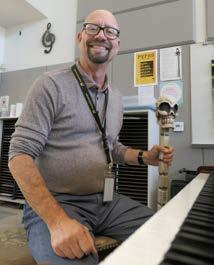
To McCracken, a good teacher always prioritizes students’ needs and listens to their perspectives. He aims to offer support to his students whenever necessary and to treat them with respect. Whether or not his students want to continue with science in the future, he encourages them to apply what they have learned in the classroom in staying aware of and understanding what is happening in the world. With this in mind, McCracken expressed what he thinks should be changed about education in the future.
about education, it would be [for there to be more of an effort] to help students recover from the mistakes they made. People should be allowed to make mistakes, learn from them and then better themselves. Once they have proven they have bettered themselves, they should get the credit for that.”
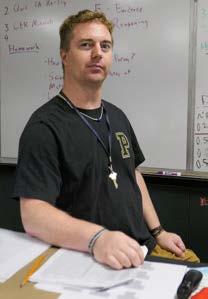
The arts have also received a new staff member. In particular, the school’s music program has gotten a lot brighter since Fred Steiner, a passionate band teacher, has rejoined the Peninsula community. Having grown up fully immersed in the world of music, including his time in high school band, Steiner knew he wanted to spend the rest of his life making music in any way he could. He spent three years on a music scholarship at Central Washington University then transferred to the University of North Texas to complete his undergraduate degree in music. After trying to work in the music industry in Nashville, Steiner realized that teaching had always been what he really wanted to do, so he moved to California to officially pursue his teaching career. Steiner was inspired by two of his high school band directors, whose guidance and passion for music showed him what a great impact teachers can have on students’ lives. Steiner’s long-term goal as a teacher is to create meaningful experiences that will allow students to grow as musicians. He is thrilled to have the opportunity to share his knowledge and passion with students and wants to encourage them to pursue the aspects of music that excite them. Even if they do not continue to pursue music after high school, Steiner still hopes the musical experience they gained in his classroom continues to impact them.
“As we develop and build the way we are doing music in our band program here at Peninsula, students will continue to have more experiences where they enjoy the opportunity to do the best they can,” Steiner said. “That tends to carry on throughout life.”
“I believe we should allow students to make mistakes because the founding principle of science is about making mistakes and learning from them,” McCracken said. “If I were to change one thing
As the school year continues, these teachers promise to make Peninsula an even more vibrant and inviting place than it already is. Within the walls of English classrooms, science labs and the music room, each teacher brings a unique approach to the school. With new and exciting perspectives and unwavering dedication, these educators hope to make an impact on every student in their classrooms.
Alisa Sekine | 10
Whether
it is the hottest summer blockbusters or an indie classic, most teenagers can agree that they love movies. But for senior Soren Kim, they are more than just a fun two hours spent at the theater. Instead, they are his biggest passion. Kim is an aspiring filmmaker who is deeply dedicated to his work. Despite being a high schooler, he has recently written, directed and edited a 10-minute short film entitled “Curtain Call.”

his father owns a creative procompany, Kim grew up sured by videography. However, not until middle school that passion for filmmaking truly to grow. He and his brother had started to get invested in their father’s work and soon grew enamored with making films. Despite being inspired by his father, however, Kim does not intend to follow his footsteps exactly. Instead of working in the commercial creative industry like his father, Kim (and his brother) hope to make movies and TV shows.
Kim has already gotten a head start on this dream with the creation of his short film, “Curtain Call.” The story follows a playwright
who uses his work to escape the grief of losing his wife to a heart attack. The playwright, named Elliot, struggles to come to terms with the suddenness of his wife’s passing. He obsessively works with his actors to perfect the play, staying up late and rarely pausing to rest. But in the end, Elliot’s play becomes a success. Because of this, despite still missing his wife, he is able to finally move on from her passing. “Curtain Call” takes inspiration from Kim’s own experiences with grief and struggle, conveying themes of perseverance, acceptance and love. Kim reflected on how his own experiences with love and loss shaped the message behind his play.
“I have felt the loss of people whether through death or through changing feelings both platonic [and] romantic, but at the same time I have felt the immense joy and happiness that comes from having a bond, and ‘Curtain Call’ is my homage to those feelings,” Kim said. “Because, in my time on earth, I’ve come to realize the best emotions and the worst emotions are all cut from the same cloth.”
These intense feelings are reflected well through Kim’s creative choices, from the script’s dialogue to the film’s lighting and pacing. The film’s attention to visual and emotional detail allow viewers to connect with the characters’ experiences on a deeper level. Sophomore Jaden Rosales explained how each of these choices impact the storytelling of the film.
“[The] subtle details such as [the] atmosphere can change the mood and direction of a scene,” Rosales said. “In ‘Curtain Call’ the darkness of the setting when Elliot speaks reflects his emotional state. Some shots show Elliot typing without showing his face [which] shows what kind of depressed state he’s in.”
The details of “Curtain Call”’s narrative are particularly difficult to achieve, as producing a short film, especially one so well thought out, is no easy feat.
Gnarly,”
“Touch” “Gabriela”– sound familiar? !ese names are none other than some of girl group KATSEYE’s most popular songs. Before creating these songs, the members were nalists on the competitive reality show !e Debut: Dream Academy, where the winners would get to form their own K-Pop group. On the show, KATSEYE caught the attention of fans around the world due to the diversity of their members. !ey claimed that they wanted to take the “K out of K-Pop,” meaning that K-Pop’s distinct style did not have to be limited to only Korean members (Cosmopolitan). !eir intricate moves and satisfying coordination also allows them to stand out in the pop music industry, and their talent resonates with many dancers. Recently, they were the main feature of an ad for Gap jeans that included an impressive dance sequence. Eventually, the ad’s in uence made it all the way to Peninsula, where it had a notable
Edited
Elyssa
impact on the Coed-Choreo team. !e team felt inspired by KATSEYE’s captivating presence during their performance. While they enjoyed the ad and appreciated the messages of con dence and empowerment, the magnetic simplicity of the dance was what really caught the team’s attention.
Since their debut, KATSEYE has released many hit songs that have corresponding dances; the variation of genres the group practices diversi es their skills and widens their audience of dancers. Because their songs allow for a variety of matching dances, the Coed team hopes to use their songs at future performances. Sophomore Katie Faal, a student on the Coed team, described how the ad inspires her as a dancer.
“As a hip-hop dancer, I feel like all of our dreams are for us to be recognized as the main spotlight, not just a background dancer,” Faal said.“Singers and actors have always gotten their rightful recognition, and I think this ad will help dancers get
This was especially true for the film’s crew, made up entirely of busy high schoolers. Because of this, the short film was completed in August 2025 despite production beginning in March 2024. During its production, Kim often had to schedule his days and schoolwork around filming. Further adding to the complications of production, many of the scenes needed were hyper specific and required multiple reshoots over multiple days.
In addition to “Curtain Call,” Kim has also pursued other projects in the realm of videography. He has Digital Photography, Video Production and Broadcast Journalism teacher James Stiles to strengthen Peninsula’s video department, helping develop new curriculum ideas for the Video Production class over the past two years. Kim also began the production of “Curtain Call” while in Stiles’ class, Stiles noted the obstacles that came from the collaborative nature of filmmaking.
“A lot of the challenges [came] from relying on a crew of people,” Stiles said. “There’s a lot of people behind the scenes. I know [Kim] had to delay some shoots because [someone] couldn’t make it.”
Looking to the future, Kim’s ultimate goal is to become a film director. He hopes to attend film school, and plans on being a part of the many different facets of filmmaking, such as directing and producing. Kim views filmmaking as the purest form of his creativity and emotions, and pursuing it brings him fulfillment. Looking back on his journey so far, Kim expressed how filmmaking has become inseparable from his everyday life.
“Filmmaking is such an integral part of my life. I can’t see my life without late nights writing or editing [and] looking at life as if my eye were a camera,” Kim said. “I couldn’t imagine myself doing anything else. I’m grateful that I can pursue that dream.”
the same attention for all the hard work we put in.” KATSEYE’s dance upli s Peninsula students both on stage and online, as social media feeds have been ooded with videos of students—like the boys football team— performing their own rendition of

Olivia Kim | 10
Despite growing up surrounded by the sounds of classical music, sophomore Davis YiNaito has begun exploring another side of music: composing original rap songs. From writing lighthearted diss tracks about his friends to releasing singles, Yi-Naito’s passion for rapping has become so much more than a hobby. He picked up rapping in middle school, and it soon became his new creative outlet as he began releasing songs on music platforms including Spotify, Soundcloud, Apple Music and YouTube Music under the artist name “2dayvis!”. While Yi-Naito shares a unique passion for rapping, his style of music also sets him apart from other rappers.
Yi-Naito’s music re ects his individuality and allows him to express his feelings about topics varying from working hard to achieve a successful future to nding love. Junior Annika Abelido described his personal style of music.
“[His music is] very versatile and very di erent,” Abelido said. “Sometimes [it is] very hype and sometimes he’s more mellow and chill. I think his style [re ects] his current mood. !e beat and the rhythm of his songs mirror his current feelings.”
Behind Yi-Naito’s style of songs lies the creative process of making raps. With just a laptop and a microphone, Yi-Naito can write a whole song in just one hour. He uses the so ware “FL Studio” to form his songs, starting with the beats and then the lyrics. By taking inspiration from artists like Usher, Drake and Rich Brian, Yi-Naito formulates his music by listening to rap as well as di erent genres like pop. !en, he chooses songs that stand out to him and uses the songs’ instrumentals in his raps, while also adding his own unique spin to the song by creating new beats and original lyrics. His methods have proved successful and enabled him to release seven
Beyond being a purely creative inspiration, the ad has also inspired Peninsula’s dancers to believe that if they worked hard enough, they can also be as successful as the girls of KATSEYE, since they achieved their success through hard work. KATSEYE’s members were put through intense competition to prove they deserve a spot in the group, and now they get to live their lives as performers that they could once only dream of (Rolling Stone). Another member of the Coed team, junior Isabella Ebilane, mentioned how KATSEYE is in uencing dancing groups as small as Peninsula’s to those at a global level.
“Since KATSEYE is a pop group, I think [their performance in] the ad will have a heavier impact on our dancing communities, especially on other all-girl dancing groups,” Ebilane said. “ !ey help portray what us dancers who look up to them are able to achieve.”
It is clear that even if the ad was originally created to promote jeans, it did so much more by giving
singles in less than a year. However, while Yi-Naito has become a productive young artist, he still faces challenges during the creative process of composing raps. When Yi-Naito struggles to nd inspiration, he o en takes a month-long break from music to clear his mind and let new ideas ow in. He also combats writer’s block by watching Korean dramas on Net ix to nd creativity for lyrics through the shows’ unique storylines. Beyond this, just like any high schooler, Yi-Naito struggles with feelings of self-doubt. Yi-Naito experienced criticism in the beginning of his new pursuit and felt that he was not skilled enough to continue with music. However, as he continued rapping, he learned to let go of the criticism and turned music into an exciting outlet for himself. !ese challenges then helped shape his growth as a rapper. Avid supporter and friend, sophomore Dhruv Gujjari detailed how this growth has occurred over the years.
“I met Davis a er hearing his SoundCloud music. Around !anksgiving [in] 2024, Davis started taking [music] more seriously, changing his name from ‘4day’ to ‘2dayvis!’ [and] making more serious music instead of just diss tracks or songs with his friends,” Gujjari said. “Davis’s rst song, ‘2025’ was not a big hit at rst, but Davis kept trying and experimenting and eventually made some bangers. He is a really hard worker and he really put in the work for his music career. Davis just needs to keep doing what he is doing and I think he could make a very big name for himself in the music industry.”
Yi-Naito’s musical growth
shows no signs of slowing anytime soon. He plans to experiment with di erent styles by collaborating with fellow Peninsula sophomore and musician Aaron Matharu, who composes rock songs under the name “Airoez”. Additionally, Yi-Naito plans to release more songs in di erent music genres like R&B and pop. He hopes that his music, no matter the style or genre, will make listeners feel relaxed and comfortable. With these goals set, he continuously strives to reach them and looks forward to his music’s future. Although he has shared that he does not plan to pursue rapping full time in the future, the joy and freedom he nds in rapping ensures that he will continue evolving as an artist. Yi-Naito shared how music has become a creative haven to escape from the busyness of dayto-day life.
“Making music is [a way for] me to test how creative I can get,” Yi-Naito said. “ It [may sometimes] get boring, but as I listen to more genres and artists, I keep nding more inspiration. !e whole process of making my own beats is something that makes me feel relaxed and [like I am] in my own world. It is like I can make [that world] whatever I want it to be.”


KATSEYE more visibility and the platform to inspire dancers worldwide. However, this Gap ad isn’t the only jean ad gaining traction as of now. Just this summer, actor Sydney Sweeney was the star of a controversial American Eagle ad that stated, “Sydney Sweeney Has Great Jeans.” !is expression sparked debates about the double meaning of the word “jeans,” referring to the idea that Sweeney’s “jeans” or “genes” were more desirable than those of others (Forbes). Yagi discusses how KATSEYE’s ad did much better than Sweeney’s ad and why.
“It was very obvious what [American Eagle’s] marketing team was trying to do [by focusing on Sweeney’s “jeans”]. [It] negatively impacted the feministic values [many of us] hold, while the Gap ad displayed a simple dance that shows the comfort and functionality of the denim,” Yagi said. “[In contrast,] the inclusivity of the KATSEYE ad succeeded at bringing all kinds of dancers [and people] together.”
!e di erence between the two ads is the
stark contrast in the way they chose to represent diversity. While American Eagle put people down by insinuating that Sweeney’s white, blonde, blue-eyed genes were “better” than other genes, Gap chose to advertise their product by upli ing the diverse populations of their viewers.
!is aspect of the ad, combined with the popularity of the dance, has led KATSEYE to have a major impacts both on fans and dancers at Peninsula alike. !ey are one of the rst ethnically diverse girl groups to reach such outstanding breakthroughs, with their EP Beautiful Chaos hitting number four on the Billboard 200 (Forbes). !eir partnership with Gap has done nothing but good for their fanbase and growth as a group due to the creation of fun dance trends that are positively in uencing the lives of both dancers and regular fans. !eir harmony as a group is a key feature to their success, encouraging many students at Peninsula– not only to follow along with KATSEYE’s journey, but inspiring them to create journeys of their own.
Acapella is a musical style performed without instrumental accompaniment, using only the human voice to create melody, harmony and rhythm. !is unique form of music highlights vocal skill, teamwork and creativity, inspiring many young musicians to explore it further. One such musician is senior Elle Young, whose deep passion for singing has motivated her to pursue new musical experiences – including acapella.
Young began singing at the age of six, and instantly fell in love with it. A dedicated member of Peninsula’s choir since her freshman year, her interest in vocal performance has only grown over time. While she loves performing with instrumental accompaniment in choir, she has also gained an appreciation for how voices alone in acapella groups can create complex harmonies and patterns. !is sparked an exciting idea in Young: creating a women’s acapella group at Peninsula. She began working on forming the group over the summer. Young explained how the idea sparked from past choir traditions that had faded during the pandemic.
“I am the publicity chair on the choir board, and during a meeting over the summer, the board mentioned that before COVID-19, they had a women’s acapella group and a men’s doo-opp group,” Young said. “So I said, well, if it is student directed then I can direct it. I was also really inspired by last year when we brought back the advanced chamber choir, a separate program outside of class that works on really advanced pieces. From that I realized that it was really fun to have di erent groups outside of choir.”
A er deciding to form the acapella group, Young had to gure out the logistics of bringing together
choir students into a new, collaborative student-run group. Coordinating rehearsal times may be di&cult, as she must establish a schedule that accommodates members’ availability and commitment. Other challenges include the process of leading the group, since Young is a rst time director, as well as choosing appropriate music for the group to perform. Despite these challenges, her passion continues to motivate her through the process, and she hopes that through this experience, she can learn more about being a director. Some choir students have found Young’s passion for singing especially inspiring. For instance, senior Yejoo Byun noted how she stands out among the group musical groups at Peninsula.
“I think she genuinely enjoys leading groups, and her love for singing feels incredibly heartfelt and sincere,” Byun said. “Starting an acapella group has been such a meaningful way for her to express that passion. Her energy and voice are amazing, and her energy is very infectious when we go to concerts. Young’s enthusiasm that [comes] from her excite ment has had a great impact on other choir members, inspiring many to explore new opportunities. Whether she’s rehears ing a new piece or encouraging others during practice, Young brings an energy that li s the entire room.”
!e acapella group is expected to perform at school events like Pen Cafe and the annual Pops Concert later this year, with Young planning to include around 10 members. Like many others, senior Emily Cota expressed her excitement about joining the group.
“I’m considering joining it because
I think that it is a wonderful way to expand myself outside of choir,” Cota said. “I think that it adds more air into the choir and a better opportunity for the choir to shine and gives us more space to grow. I also think that the acapella group can be a great way to welcome many di erent people and really show them what choir can do.”
While there will certainly still be challenges for the group to overcome, Young is certain that her Acapella group o ers a pivotal experience for Peninsula’s singers, and she remains determined to create a new space to gather and sing.
“I think it’s really important to create a space


Colin Kim | 12
The Paper,” a new spin-off series of the hit show “The Office,” has recently released its first season for streaming on Peacock on Sept. 4th. Greg Daniels, the creator of “The Office,” came back to co-write and direct “The Paper” along with Michael Koman, who is known for producing the award-winning series “Nathan For You” (IMDb). Daniels was originally hesitant to create a spin-off, but after years of fans asking for one, he came to the conclusion that instead of using the same cast as “The Office” he would simply include the same documentary crew with a new set of characters, aside from accountant Oscar Martinez who returns from the original show (Television Academy).
Daniels and Koman worked together to create “The Paper” in hopes of portraying the chaotic lives of inexperienced journalists throughout ten episodes. Daniels shared that in an age where fewer and fewer people actually read a physical newspaper, he wanted to highlight the art and struggles of a small town newspaper (Hollywood Reporter).
ters’ romances and relationships that the original had. From the beginning, it is difficult to engage with characters like Esmerelda, whose personality seems flanderized in comparison to Michael Scott’s. Likewise, Ned and his love interest, Mare’s, relationship follows a very similar formula to Pam and Jim’s in “The Office”, yet feels shallow and less authentic because of how little it is able to develop over just 10 episodes, compared to “The Office”’s longer seasons.
work well with audiences and prioritize the screentime of those who do. Beyond this, some underdeveloped characters simply have not had enough time to solidify a connection with audiences, such as janitor Nate Wells or secretary Anne.
Aside from divisive characters, another disservice that the team behind “The Paper” did to themselves is marketing the show as a spinoff of “The Office”, instead of an entirely new shot with brand new plotlines, a thought senior Mia McKiernan shared as well.

The storyline begins with protagonist Ned Sampson’s discovery of a dying newspaper, “The Toledo Truth Teller,” whose staff is currently being filmed by the same fictional camera crew that filmed “The Office”. Ned soon finds himself in Toledo to revitalize the paper, while assembling a team of inexperienced journalists who prove themselves to be less than competent. However, as the season progresses, audiences witness the growth of these characters as journalists, friends and human beings. The characters prove to be just as eccentric and absurd as their “The Office” counterparts. For instance, Adam Cooper, played by comedian Alex Edelman, is a grown man who brings a lunchbox packed by his wife to work every day, while Esmerelda, played by “The White Lotus” star Sabrina Impacciatore, is a self-important, overbearing boss who offers a clear parallel to Michael Scott.
However, despite these similarities, the general audience consensus is that the show has its comedic and clever moments but remains less memorable than the original series. While “The Paper” brings back the same dry humor of “The Office”, it lacks the character development and buildup of charac-
These shorter seasons also make “The Paper” lack the sense of familiarity and com fort of its predecessor. One can easily play an episode of “The Office” out of order and un derstand the show’s plotline, its characters and the world that it operates in. Mean while, “The Paper” has a strict sequential storyline throughout the season that makes it nearly impossible to watch out of order or without sufficient background information. When this is combined with all 10 episodes releasing at once, instead of the weekly releas es that “The Office” had, “The Paper” fails to live up to the legacy of the original show. Senior Talon Gerard shared thoughts on the show which reflect the divided opinions that many viewers have.
“The show focuses on all new characters so it shouldn’t be compared to ‘The Office’,” McKiernan said. “You can watch the show without previously watching ‘The Office’. Although it has the same type of humor as ‘The Office,’ the cast and story is almost entirely different. It’s actually pretty hilarious.”
Meanwhile, other students like senior Dakota Pfligder felt that the show is, undeniably a sequel to “The Office,” but largely unnecessary.

“I kept seeing ads for it all over TikTok and Instagram and I finally decided to watch the first few episodes of it recently. It is a fun watch especially if you’re into journalism,” Gerard said. “Characters like Ned and Mare are the highlights of the show. While characters like Esmerelda and Ken are annoying.”
In order to improve these issues with characters, “The Paper” needs to evaluate which characters
“‘The Office’ ended on a really good note and didn’t need a sequel,” Pflidger said. “[Besides this, the creators of ‘The Paper’] didn’t promote the series well enough because although I am a fan of ‘The Office’, I didn’t even know that ‘The Paper’ existed until very recently.”
Despite mixed audience reviews of “The Paper”, it has recently been announced that the show has been renewed for a second season. With more episodes and time with the characters, its return will expectantly allow for better dynamics and more memorable relationships to develop. While it has big shoes to fill, “The Paper,” and its potential, has the chance to step out of “The Office”’s shadow.
Emmersyn Hadley | 9
The new movie “K-Pop Demon Hunters” has created a buzz in the film industry ever since its highly anticipated release on Aug. 23. In just a matter of weeks, the movie skyrocketed to over 314.2 million views, becoming Netflix’s mostwatched movie of all time (Vanity Fair). This movie has been regarded as a moving work that both kids and parents can enjoy through its combination of action, storytelling and vibrant music performances. Its blend of adventure and pop idol characters has seized the minds of its audiences, especially its younger viewers.
It could be argued the movie is so popular among younger viewers thanks to its musical factors, with almost Disney-like songs and bright, colorful designs that naturally appeal to children. However, its success is not limited to love from younger audiences as the movie and its original songs have surpassed records and dominated charts. The film’s achievements have been well-timed, following the rise of Korean Popular Music (K-pop), a South Korean music genre influenced by hip hop and R&B, has become such a major success and the music community’s growing influence in Western entertainment with over 150 million listeners worldwide. “K-Pop Demon Hunters” became a well-known and
demons that aim to feast on the souls of people. The narrative progresses as Huntrix finds out that their main competitors, a new boy band whose popularity threatens their own, are concealing a serious secret. Though at first appearing to simply be another group competing for recognition, the boy band has unknowingly been fighting dark forces: evil demons that consume the energy of Huntrix’s fans. Upon learning this, Zoey, Mira and Rumi understand that this competition goes beyond mere musical rivalry. Because of this, they must unite with their former rivals to defend their fans and stop the demons.
Beyond the exciting action and musical numbers, the movie deals with themes that touch viewers of any age. One major storyline involves Rumi, who keeps a secret from everyone, even her friends. As things get more serious, she has to face this truth. Her path to being honest and accepting herself quietly impacts the film, adding depth to its spectacle. Her path through honesty and self-acceptance becomes the emotional substance of the movie. As Rumi hides her secret, the group’s friendship is put under such pressure that it almost breaks apart. However, through honesty and teamwork, the trio is able to discover the best way to overcome their battles derives from the irreplaceable bond they share. Freshman Taeyon Kim felt that “K-Pop Demon Hunters” highlights the importance of truthfulness and openness through her journey.
“The theme I noticed when watching ‘K-Pop

Demon Hunters’ was the importance of friendship and honesty,” Kim said. “Rumi, the entire movie, keeps important secrets hidden from the people she claims to trust most. Only at the end [does] she find out that her secrets are a crucial part of who she is.”
Social media platforms such as Tiktok have also contributed to the movie’s popularity through trends, edits and dances to songs from the movie (New York Times). For a film like this, social media can also be necessary in creating a space for people to discuss the movie. Social media algorithms allowed the movie to gain so many dedicated fans and views by recommending it to many different people. Despite never intending to view the movie, sophomore Olivia Gample shared how powerful the movie’s presence is on social media.
“Although I haven’t watched ‘K-Pop Demon Hunters’,” Gample said, “I’ve heard many of the songs through social media.”
Critics suggest the movie depends on its glamorous aesthetic and doesn’t offer anything more. Others wonder whether the praise is simply a result of the social media attention the film received. However, these critics are mistaken because the aesthetically pleasing character designs and bold colors allow the movie to be appealing and understandable for the children whom the movie is marketed for.
A notable part of the film are the catchy songs that get stuck in viewers’ heads as soon as they begin. A popular song is “How It’s Done” which is unique in the soundtrack due to its role in introducing “Huntrix”. “Golden” is another top choice with a message on accepting one’s true identity in its lyrics and notes that make the song impressive. “Golden” has topped Billboard Hot 100 and the UK’s Official Singles lists, adding to the movie’s popularity. In the end, “K-Pop Demon Hunters” does deserve the fame it has received. Between the songs that have playing over and over again on the radio and in many fan’s heads and the conversations friends have had about the movie, countless people are now realizing how well the movie was constructed, combining trends with universal emotions.
- Taeyon Kim | 9 "
Rumi, the entire movie, keeps important secrets hidden from the people she claims to trust most. Only at the end [does] she find out that her secrets are a crucial part of who she is. "
Rather than just dismissing “K-Pop Demon Hunters” as another children’s movie or passing craze, audiences should take the time to find the film’s deeper messages of honesty, self acceptance and friendship.
This summer, the names Belly, Conrad and Jeremiah have been everywhere as the third and final season of “The Summer I Turned Pretty” was released. From viral TikToks, to collaborations with the brand Coach, “The Summer I Turned Pretty” has undoubtedly embedded itself into pop culture. This hit Prime Video coming-ofage romance and drama series, directed by author Jenny Han and adapted from her best-selling book trilogy, aired its final episode on Sept. 17. The show stars Lola Tung as Isabel “Belly” Conklin, Christopher Briney as Belly’s longtime crush Conrad Fisher and Gavin Casalegno as Belly’s closest friend turned love interest, Jeremiah Fisher. The story follows Belly as she navigates relationships, grief, coming of age and, of course, love.
At the center of all three seasons is the love triangle between Belly and the two very different boys. The fight for Belly’s heart attracted lots of fans to the show, with them backing the respective “teams” of each brother. While Jeremiah is fun-loving and charming, most fans seem to support Conrad — a deeply layered character, who is always quietly self-sacrificing and constantly wrestling with an internal storm of emotions. In the first season, at only 18 years old, he was carrying the unbearable weight of knowing his mom, Susannah, was dying of cancer. Instead of seeking help from those closest to him, Conrad turned inward, bottling everything up and shutting out everyone he loved, including Belly. Even while everything was falling apart for him, he continued to be there for Belly, supporting her choices and showing up for her in hard times. But while trying to hold onto her while losing everything else, he forgot to hold onto himself, and soon became bristly and rude, making him seem like he is not exactly the ideal love interest for sweet and good-natured Belly.
choice. One viewer, sophomore Brooke Kumamoto, shares her feelings on Conrad’s yearning.
“Obviously [I am] ‘Team Conrad’,” Kumamoto said.“Whenever Conrad yearns for [Belly], those are my favorite [moments] of the show, [Conrad] is the definition of chivalry. Even though Conrad and Belly had complications, he had a reason [for acting the way he did] because his mom was dying.”
nostalgia rather than growth. One fan, junior Graziella Saccomanno, explained her thoughts on the love triangle.
“[I am] definitely Team Conrad,” Saccomanno stated. “I used to be Team Jeremiah, but after season three [played] out, I am Team Conrad all the way.”

The debate between whether Conrad or Jeremiah should be with Belly has evolved far beyond the storyline itself. It has become a cultural phenomenon fueled by fan discourse, social media trends, memes and even brand marketing. TikTok edits, X threads and Instagram memes have turned the love triangle into an internet battleground, with fans dissecting every glance and quote to prove their side. Conrad has emerged as the audience’s favorite for his emotional and complex character while Jeremiah has mainly received backlash for his immaturity and manipulative tendencies. Meanwhile, others defend Jeremiah as the more stable, supportive choice. Some viewers point out that he loved Belly before she “turned pretty”; however, this only led others to counter that Jeremiah only started to like Belly when he realized Conrad did.
However, what makes Conrad stand out is not his complexity; it is his growth. By season three, Conrad steps into emotional maturity. He becomes someone who has faced grief, made mistakes and comes back stronger. He becomes the version of himself that Belly had always seen him as. And at his core, Conrad is a yearner not just for love, but for connection and belonging. That quiet yearning makes him deeply romantic in a way that’s understanding and unforgettable. He doesn’t fight, he feels deeply, and for a love story built on history and hope, that kind of emotional depth and maturity makes Conrad the better
-Brooke Kumamoto | 10 " "
Obviously [I am] ‘Team Conrad.’ Whenever Conrad yearns for [Belly], those are my favorite [moments] of the show. Conrad is the definition of chivalry.
The show finally came to an end with its final episode airing, signaling an end to the love triangle as Belly decisively chose Conrad, a win for his supporters. Although the finale was released Sept. 17, fans were not quite ready to say goodbye to Cousins Beach, feeling as if the ending did not provide a sufficient close to their story. Han responded accordingly when she announced that “The Summer I Turned Pretty” would return with a movie in 2026. Junior Mayah Singh-Barrett expressed her own hopes for the movie.
While Jeremiah might be fun and attentive, those traits don’t necessarily mean he is the right choice for Belly. His lighthearted nature added charm to the earlier seasons, but when it comes to serious issues, emotional depth and long term compatibility, Jeremiah often falls short. His tendency to avoid difficult conversations and his impulsive decisions, shows a lack of emotional maturity that Belly ultimately needs in a partner. While Jeremiah may have been a comforting presence in Belly’s younger, carefree summers, their relationship often feels more like
“I’m really excited for the movie. I’m curious to see how they write about the characters’ new lives, especially after the finale,” Singh-Barrett said. “I just hope [there] isn’t much conflict.”
From the information that has been released, the film is expected to provide a definite conclusion to Belly and Conrad’s story, picking up right where the series ended. While no plot details have been released, in a Prime Video press release Han hinted that “there is another big milestone in Belly’s journey.” Lola Tung and Christopher Briney are confirmed to reprise their role. Though an exact release date has not yet been announced, fans are eagerly anticipating the next chapter in this beloved series.
Kyra McGath | 10
For the past decade, the girls varsity volleyball team has fought against one of their rivals, Chadwick every year. Each game, Chadwick seemed to come out on top, but that all changed on Aug. 26 when the volleyball players brought home a win, beating Chadwick with a final score of three to two.
During the first set of the game, one of Peninsula’s setters tore her ACL, creating a challenge that briefly shook the team’s focus. Despite this setback, the girls fought hard to regain momentum, diving for balls and hustling across the court to keep the ball in play. Despite their best efforts, however, Peninsula lost the first two sets to Chadwick. With the game on the line in the third set, the team regrouped after a quick huddle with Coach Kevin Williams, to reset and refocus their energy.He reminded them to trust their skills, communicate and play with confidence rather than fear. In the third set, they then began to apply pressure on Chadwick by reinforcing their defense and offense, leading to a major shift in momentum. The team’s comeback had officially begun.

fifth sets, where they ultimately completed a reverse sweep – coming back and winning the game after losing the first two sets. In the fourth set, Peninsula performed with strong serves and clear communication in order to gain control the game. Meawhile, the team’s hitters began finding open spots on Chadwick’s side.
know we always have an opportunity [to win] if we just go out there and put our effort in.”
One of the ways the coaches were able to improve the teams’ performance was through the implementation of changes to the practice routines. Over the years, Williams’s coaching style has undergone drastic changes, and this year his efforts came to fruition. Williams has upped the intensity of practice, with tougher, longer training sessions that mirror football footwork drills. During practice, they focus on serving, hitting, passing and blocking with a scrimmage at the end. These new training techniques encourage the girls to give their all at practice, hoping to make their coaches proud. Senior and varsity captain Emmanuel (Emmy) Kang shares where her motivation comes from.

The back row stayed dependable, refusing to let anything hit the floor. By the time the fifth set started, the energy in the gym was tense. Every point was a battle, but the team’s confidence and teamwork never wavered. With the crowd cheering them on, they closed out the match, securing a hard-fought three to two victory.
Williams reflects on the team’s high emotions during the Chadwick game.
They carried that same energy into the fourth and
“Our emotions really got into that game. I think we all were a little uptight, but we calmed down, [because] it is hard to do a reverse sweep,” Williams said. “We don’t give up, we fight to the end and we
At only 16 years old, Junior Allie Chang has already committed to Columbia University’s women’s soccer team. As a sophomore last season, Chang led the Peninsula girls varsity soccer team with eight goals and tied for the most assists on the team. In 12 games played, she logged 500 minutes on the field. This is a significant contribution from any player, but it is especially impressive for a sophomore playing on varsity.
Aside from Peninsula’s varsity team, Chang also has played club soccer for Beach City Futbol Club, which is part of the Elite Club National League (ECNL). ECNL is highly recognized for the
highest level of play in the nation and is a hub for scouting and recruiting. The league hosts events that are intended to showcase talent for college scouts and coaches across the nation. In April, it was announced that over 73% of girls Division 1 soccer commits for the class of 2026 were from the ECNL. Through the ECNL, promising players such as Chang are allowed to grow and strengthen their skills to meet a high standard of performance, which Chang clearly demonstrated during her time with the Beach City Futbol Club. While part of Beach City, Chang earned the ECNL Southwest All-Conference First Team honors for the 2024-25 season. After all of her hard work and practice, it was quite exciting news when Chang got the offer to play at Columbia. Chang relived the moment and the peo-
“My biggest inspiration is Coach Massey; he’s always been very positive and supportive even when we are playing poorly,” Kang said. “I really appreciate him as a coach [because] he always makes me want to push myself harder.”
With a landmark win against Chadwick behind them, the team now has their sights set on a bigger goal: making it to CIF. Practices will continue to be intense, with a strong focus on consistency, communication and mental toughness. Senior and varsity captain Kennedy Young expresses her motivations behind setting these goals for the upcoming season.
“I want to have a good season since it’s my senior year and I want to be the best player I can be,” Young said. “We all want to qualify and go to CIF, so we have all been putting in work to make ourselves better and if we keep on pushing each other to do our best, we can do it.”
ple in her life that helped get her that important moment.
“I was really excited since Columbia has been my dream school, so when I got the call to play there, I was really happy,” Chang said. “I had some confidence since our team and [the] players in our club are really high level and I know a lot of girls that I’ve played with that have committed to Division 1 universities.”
Throughout Chang’s childhood she has always been encouraged to play

For decades, the United States Open Tennis Championships have been the battleground for matches between tennis legends like Arthur Ashe, Serena Williams and Roger Federer. However, in recent years, the U.S. Open has become just as much a cultural spectacle as a sporting event. Viral cocktails, celebrity selfies, country club-inspired lookbooks and influencer guest lists are sharing the spotlight with the sport itself.
In recent times, fans have begun to notice the changes involving the media influence surrounding the Open. The tournament has recently developed a “Coachella-like” vibe, where influencer guest lists and luxury brand activations shape much of the coverage (The Guardian). Guest lists featuring stars such as Usher and Kevin Hart now circulate online nearly as widely as player rankings. Meanwhile, luxury brands like Ralph Lauren and Tiffany & Co. host exclusive lounges, fashion collaborations and eye-catching installations that draw celebrities and influencers to the tournament.
Nothing captures the tournament’s transformation better than the Honey Deuce. Sold in commemorative cups, the aesthetically pleasing, vodka-and-lemonade concoction has become a social media staple of the Open. The United States Tennis Association (USTA), the governing body for tennis in the U.S. and the one responsible for organizing the event, made $17 million from Honey Deuce sales in 2025 alone, with 738,459 cocktails sold over three weeks in New York City — a 32% jump from last year (Sportico). This viral drink has clearly made a statement on TikTok, where the hashtag “#HoneyDeuce” has racked up millions of views, with fans rating the drink, filming “first sip” reactions and showing off the collectible cups as souvenirs. Influencers like Morgan Riddle, known for her behind-the-scenes U.S. Open content, shared her Honey Deuce experience with her hundreds of thousands of followers, while even pro player Jessica Pegula joked about drinking one after a tough loss (Entertainment and Sports Programming Network). However, not all tennis enthusiasts are thrilled with the up-and-coming media craze surrounding the
soccer, especially by her father to whom she credits her improvement over the years. She has been playing the sport since age three and has wanted to play at the collegiate level for as long as she can remember. Many positive traits and skills are needed in order to reach such an important milestone. Chang’s teammate, Junior Kealani Vega, commented on the leadership skills she sees in Chang and how they played together.
“Chang is very confident and that’s a really good leadership trait because we all feed off her energy,” Vega said. “She [also] has a really good soccer IQ, so [through her IQ] we were able to play a lot of natural soccer. We [have] really good teamwork and progression through the field.”
Chang has clearly stood out to coaches and peers
U.S. Open. Brendan Harden, a coach at the Jack Kramer Club- a historic tennis club known for nurturing and developing top players (USTA), worries that the rise of social media trends surrounding the U.S. Open is shifting focus away from the tournament itself.
“The sport is starting to feel like it’s taking a back seat to the whole craze [over the tournament],” Harden said. “Young athletes don’t get inspired by a drink going viral, they get inspired by watching players give everything they have to pull through a five-setter. [If it keeps going this way], we might lose sight of the passion that makes ten- nis special.”

While some fans are skepti- cal, others recognize that this cultural shift may be part of tennis’s advancement. With a younger generation consuming sports through short clips, aesthetic trends and influencer partnerships, tourna- ments like the U.S. Open may need to adapt to stay relevant. Social media exposure can make tennis feel more modern and global, appealing to audiences who might otherwise overlook it. Christian Pohoski, a top American junior player who competes in national-level tournaments, views this new environment in a similarly double-sided manner.
“You can’t scroll through Instagram without seeing someone at the Open posting about the Honey Deuce or which celebrity is courtside,” Pohoski said. “Don’t get me wrong, I’m not unhappy to see tennis trending online, but sometimes it feels like it gets lost in the mix. It can be frustrating that the social media aspect gets more attention than the tennis. But at the same time, if it helps the game evolve and reach more kids, maybe it’s a good thing.”
His words reflect an era caught between excite-
throughout her soccer journey. Her coaches attribute her success on the field to her strong sense of work ethic, determination and intelligence of the sport. They acknowledge that Chang has devoted time outside of her schedule to become the best soccer player that she can be, which has paid off. Girls’ varsity soccer head coach Magali Blazevic explained what kind of player Chang is and what it takes to follow after her success.
“Chang has the determination to succeed in everything she puts her mind to. [She’s] intelligent, a great teammate [and a] vocal member on the field,” Blazevic said. “If you want to play at a Division 1 school or even Division 2 or Division 3, you need to make sure that you’re putting in extra work, but you also need to be [a] good teammate who has a good
ment for tennis’s new spotlight and a hope that people still remember why they fell in love with it in the first place. At the same time, the increased exposure has had undeniable benefits for the sport. Viral moments, sponsorships and celebrity appearances help tennis reach audiences who might not otherwise tune in. For a sport like tennis that often competes for attention within a crowded sports media landscape, the viewership gap highlights just how much exposure it still needs compared with other major sports leagues. Nearly 70% of U.S. adults watch the National Football League, about 50% follow the National Basketball Association and close to 45% watch Major League Baseball. By contrast, only about 18% of viewers regularly follow tennis (S&P Global Market Intelligence). This amount of cultural relevance can attract new fans and make the sport feel relevant and exciting for today’s youth. Fans who have grown immersed in the world of tennis have noticed the U.S. Open’s transformation as well. Still, some fans feel that the glamorization and media frenzy of the Open takes away from the appreciation of the sport. Freshman David Young, an avid fan who spends his summers at the International Tennis Hall of Fame, admitted he has mixed feelings about the Open’s new atmosphere.
“When I watch the U.S. Open, what excites me [the] most are the matches themselves, especially seeing players like Taylor Fritz,” Young said. “But sometimes it can feel like the tournament is more about celebrities and influencers rather than [about] fans who actually care about the sport. For people who don’t know much about the sport, the parties and social media stuff make it look fun and approachable. But for fans like me, it sometimes feels like tennis isn’t being taken as seriously.”
The U.S. Open currently stands on a fine line between the divide of sticking to tradition or giving in to exhibition and pageantry. While its flashy atmosphere and viral moments may draw in fans and bring tennis into the cultural spotlight, they also risk overshadowing the skill, passion and drama that make the sport. It will be the responsibility of tennis fans of the future to make sure the sport remains as the heart of the tournament, even as its spectacle continues to grow.
work ethic and takes criticism as a point of improvement and not as an attack.”
Chang’s athletic identity reflects leadership, dedication and the desire for growth which are vital to athletic success. All of these qualities have contributed greatly to Chang’s success and will continue to shape her as a player in the years to come. Chang, now entering her junior year, will continue to play for Peninsula this season. After graduating high school, she will join Columbia’s girls soccer program as part of Columbia’s class of 2031. Chang’s success serves as an inspiration for young athletes wanting to succeed and proves that with a strong work ethic and determination, anyone can achieve their dreams, no matter how difficult or impossible they may seem.
Gunnar Lee | 11
Thestart of this school year marks the beginning of a bold era for Peninsula as it embraces new leadership. Dr. Brent Kuykendall’s resignation as principal at the end of last year shocked many; his energetic direction transformed Peninsula’s image from a strictly competitive institution into a school that balances academic excellence with school spirit. After eight years under his leadership, both students and staff were eager to learn who would inherit the position, and continue Kuykendall’s legacy as a positive influence on the entire Peninsula community. Dr. Kyle Garrity was announced as Kuykendall’s successor in May and officially became principal on July 1. Junior Teddy Boustany shared his feelings of anticipation during the transitionary period.
“I was shocked at the news of Kuykendall’s resignation,” Boustany said. “He was beloved by the students and staff. His charisma and concern for our wellbeing left a lasting impact on us, [so] my friends and I were curious to see who the next principal would be. We were surprised when Dr. Garrity was chosen: we all expected [it to be] one of the teachers at Pen. So far he has been a worthy [successor].”
Despite his unexpected arrival, Garrity’s background proves he’s well-prepared to serve as Peninsula’s principal. He was born and raised in rural Montana, where educators were deeply involved in community life. Following in the example of his maternal grandmother, mother and brother, he decided to pursue a career in education. He went on to complete an undergraduate degree from Carroll College before receiving his masters in theological studies from Harvard University and a PhD in Education Policy at UC Riverside. With a passion for education and years of academic experience under his belt,
Garrity started working as a social science teacher, baseball and football coach.
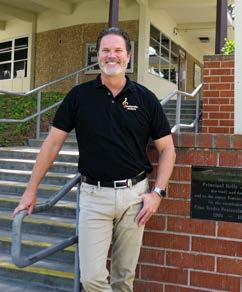
During these 15 years he was also head of a teachers’ association and a coordinator for Peer Leaders Uniting Students (PLUS). His first promotion to an administrative position was at a school markedly different from Peninsula: an underfunded school with an underperforming student body plagued with student aggression issues. Garrity served as a member of the new school board responsible for overhauling the system and addressing the school’s varied problems. His later work as assistant principal at Redondo Union High School and later at Palos Verdes High School proved to be the opposite of his
experience in Riverside County; rather than having to start at rock bottom, Garrity now focused on improving the programs of the academically established institutions in a new area of California. Junior Jaden Song reflected on Garrity’s past experience.
“Dr. Garrity’s resume makes him perfect for principal,” Song said. “His work at various school districts makes him flexible [and] able to face all kinds of challenges. His early life proves his commitment to education and the school system. He also attended impressive colleges.”
As soon as he became Peninsula’s new principal, Garrity sought to refine the school’s balance between academics, the arts and athletics. He is interested in improving curriculums by having them cater to changing jobs market and improving the arts materials and athletic fields. He is also focused on increasing student connection and enthusiasm by encouraging students and staff alike to adopt a mindset that is focused on living in the moment. With this in mind, Garrity has implemented the new “Spirit Fridays”, seeking to increase student involvement, cultivate Panther Pride and end stressful weeks with a day dedicated to fun. Under his leadership, Peninsula’s campus has begun renovation, with plans to begin work on repainting the old buildings and modernizing technology on campus. Garrity spoke on the impact he wants to leave on our campus.
“Ultimately, I always want to be remembered as a nice person who helped people be their best—in life and their profession—and find a way to make their journey easier. For teachers and staff, I hope to help them find connection with each other and joy in what they do,” Garrity said. “I hope [the students] remember me as a figure who supported and guided them to their happiness. I want them to leave this place thinking, ‘that guy cared about me’.”
